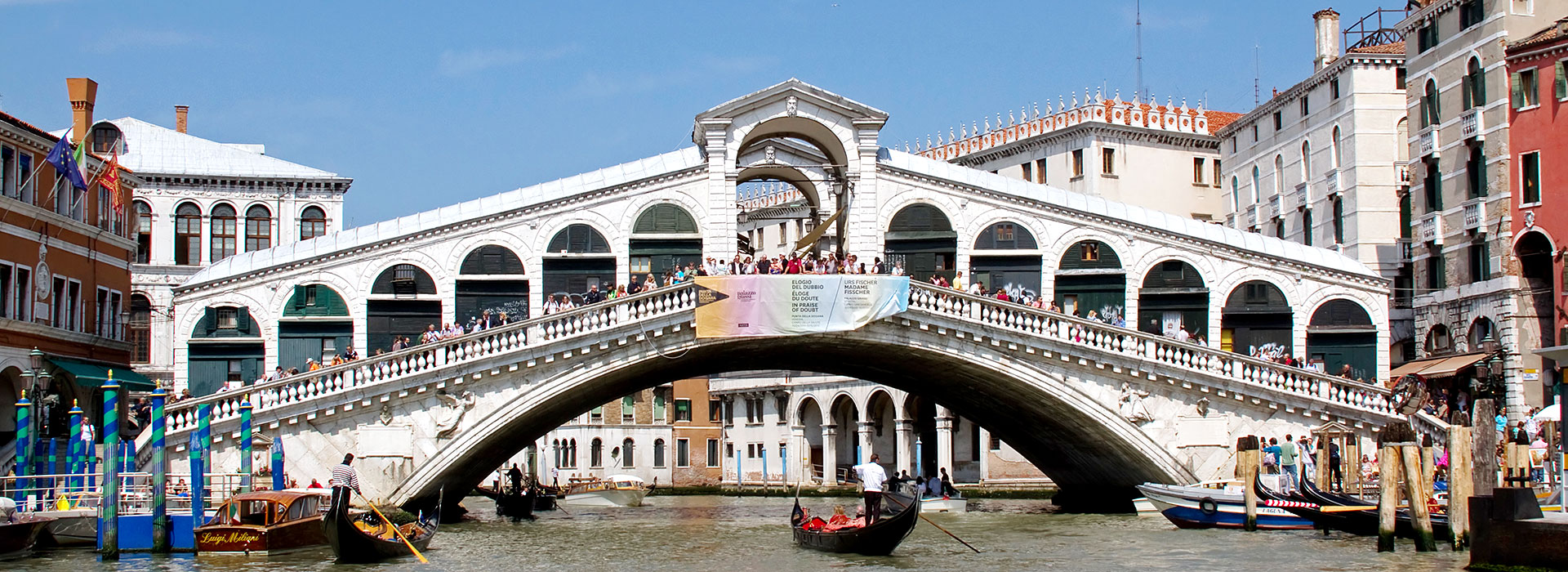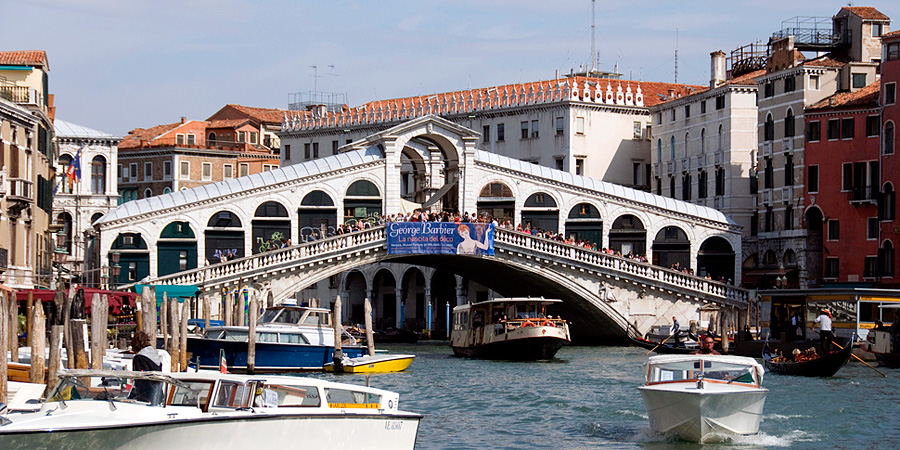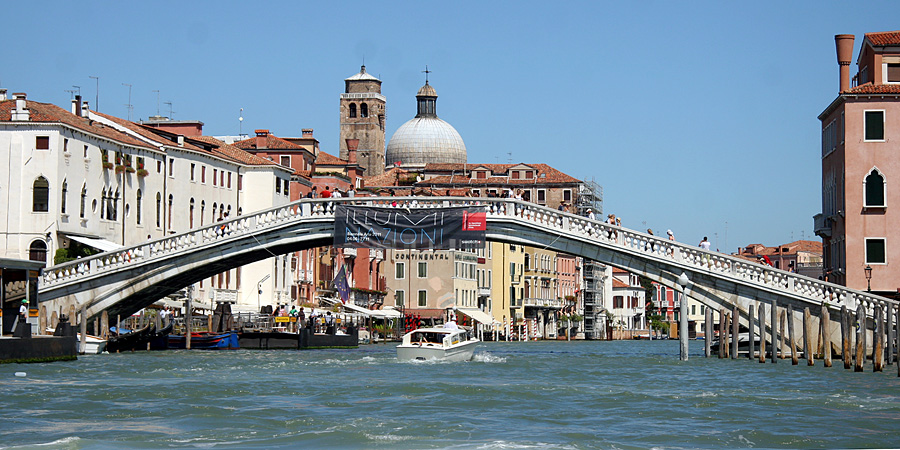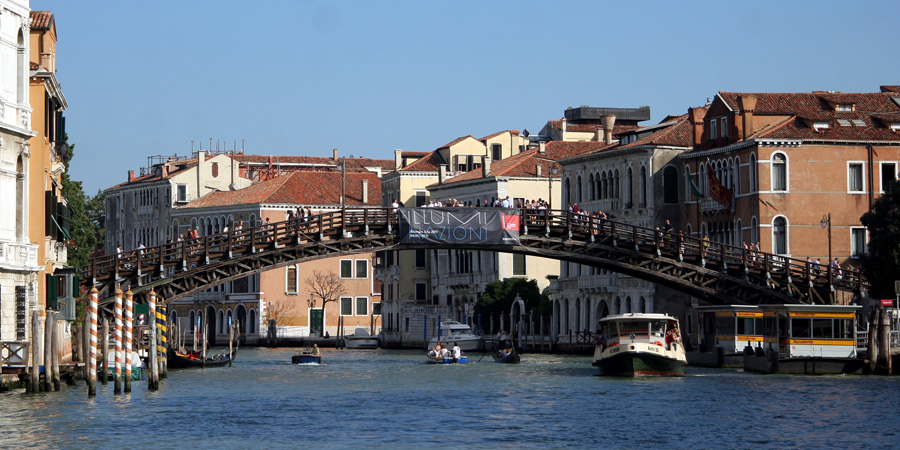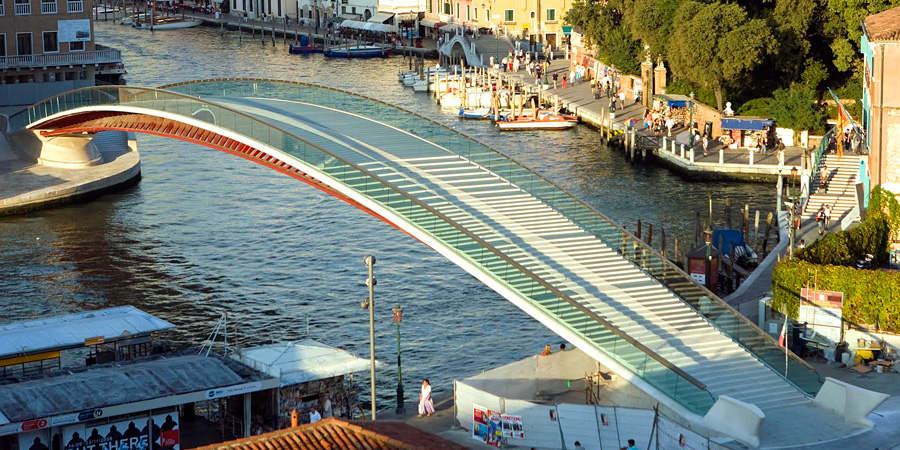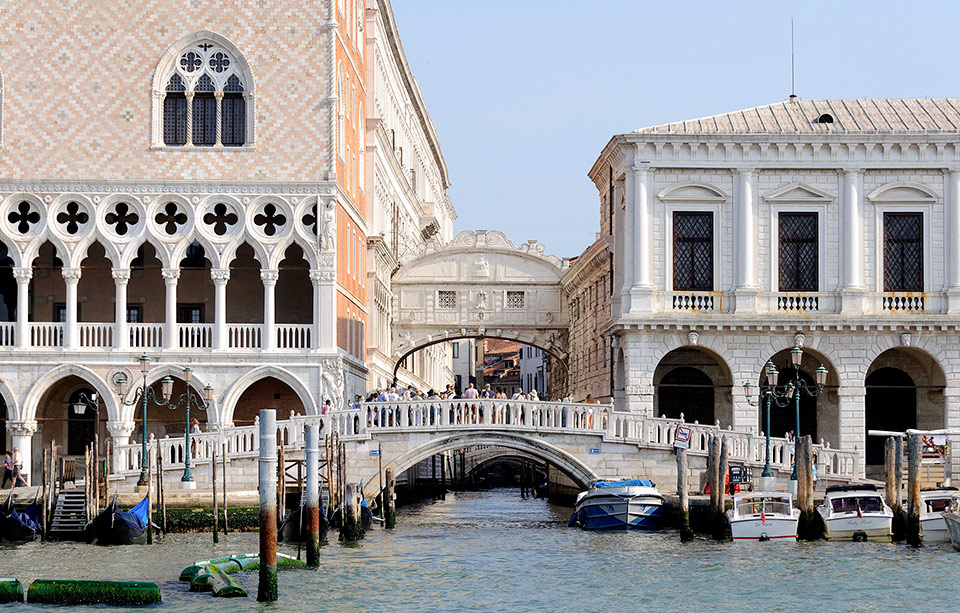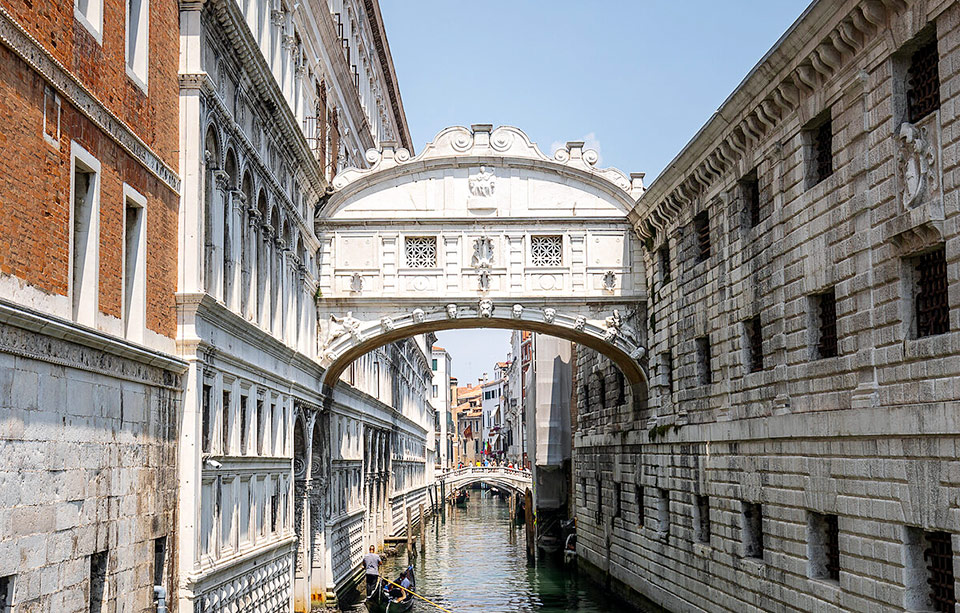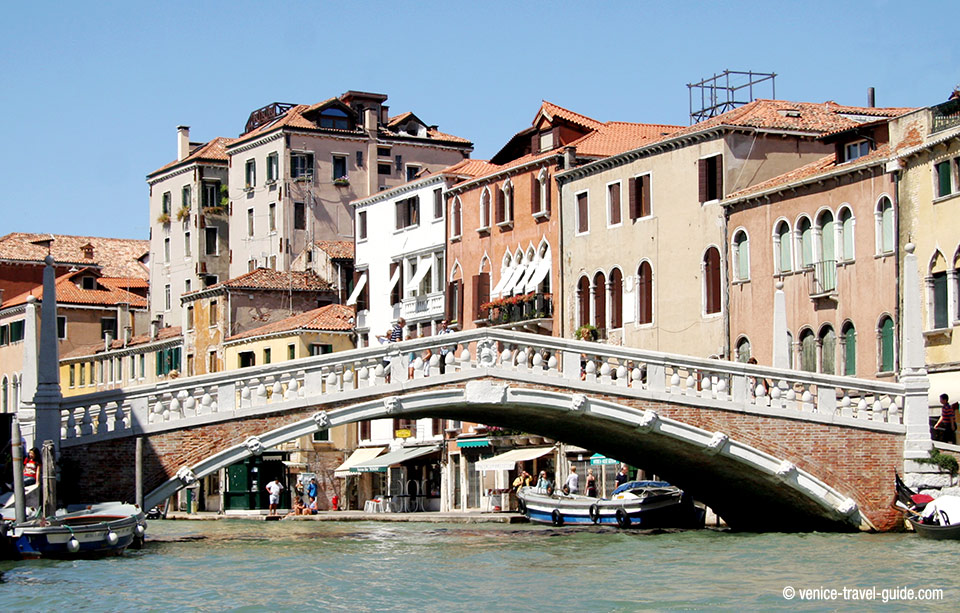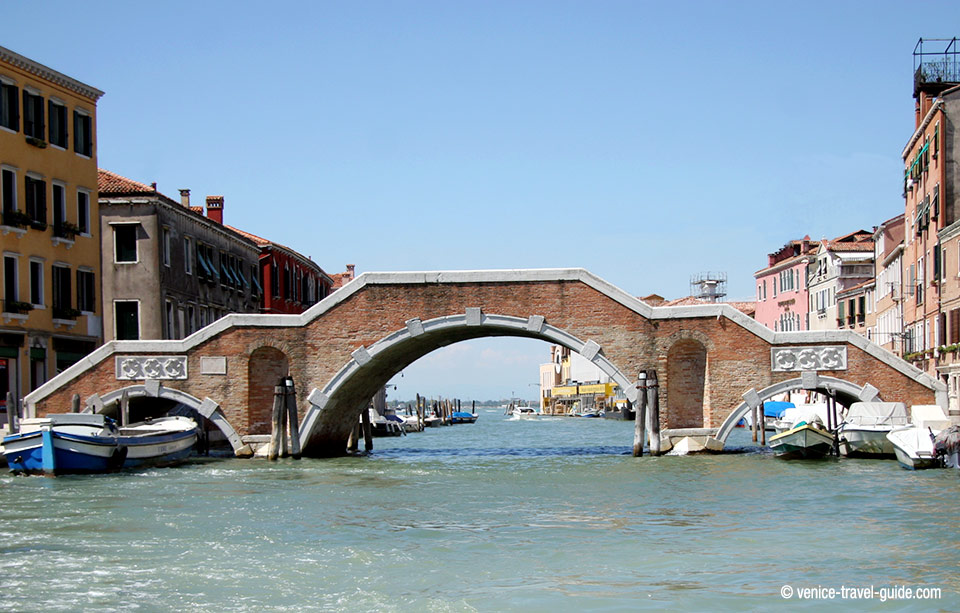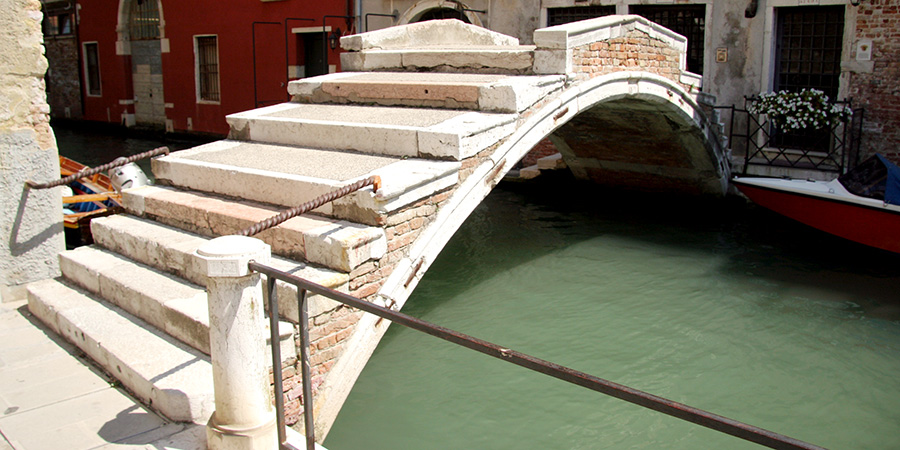Rialto Bridge is the main bridge of the four bridges crossing the Grand Canal in Venice, Italy. The Rialto became an important district in 1097, when Venice’s market moved there, and in the following century a boat bridge was set up across the Grand Canal providing access to it.
Venice Bridges
The waterways are the lifeblood of the city and the most well known canal in Venice is the Grand Canal, known by the locals as the most beautiful street in the world. The Grand Canal is crossed by four bridges: the Rialto bridge, the Ponte degli Scalzi near the railway station, the Accademia bridge near the eponymous art gallery, and a fourth bridge, the Constitution bridge, designed by Santiago Calatrava, which is a link between the railway station and Piazzale Roma.
Without a doubt, the most famous bridge in Venice is the Rialto Bridge, which has become an icon of the city. Rialto Bridge is also the main and oldest of the four bridges over the Grand Canal and until the 19th century, it was the only way to cross on foot from one bank to the other.
An alternative way of crossing the Grand Canal is to take a traghetto, a gondola-like boat capable of ferrying a dozen or so passengers from one bank to the other; for a small fee you too can enjoy the experience of being rowed across the Grand Canal and of having an original perspective of it.
In the past, bridges of Venice were built by the owners of buildings adjacent to the canals or were financed by a neighborhood tax. These were wooden bridges, often simple boards resting on the banks of a canal, and which were crossed on horseback. Stone bridges came later and none had railings. These were placed, made of brick or iron, at the beginning of the 19th century during Austrian domination.
The oldest bridge in stone in Venice was the beautiful Ponte della Paglia (Straw Bridge), built in 1170, which crosses the Rio di Palazzo next to the Doge's Palace, connecting the Piazzetta with the Riva degli Schiavoni. This bridge is usually full of tourists because it allows an excellent view of the Ponte dei Sospiri (Bridge of Sighs).
The only bridge without a railing found in the historic center of Venice is the Ponte Chiodo, near the Ca' d'Oro, in Cannaregio. There is another bridge without a railing, the Ponte del Diavolo (Devil's Bridge) on the island of Torcello.
But... How many bridges are there in Venice? The number of bridges in Venice is 438, of which 90 are private, and which adds up to 455 if the Murano (9) and Burano (8) bridges are included.
The 10 most beautiful bridges in Venice (Italy) are: Ponte di Rialto, Ponte dei Sospiri, Ponte della Paglia, Ponte dell'Accademia, Ponte degli Scalzi, Ponte Chiodo, Ponte dei Pugni, Ponte delle Guglie, Ponte de l'Arsenal or del Paradiso and Ponte della Costituzione.
The Ponte degli Scalzi, literally, bridge of the barefoot monks, is one of only four bridges in Venice to span the Grand Canal. The bridge connects the sestiere of Santa Croce and Cannaregio. On the north side, are the Chiesa degli Scalzi and Santa Lucia train station.
The Ponte dell'Accademia is one of only four bridges in Venice to span the Grand Canal. It crosses near the southern end of the canal, and is named for the Accademia galleries. First suggested as early as 1488, a bridge was not constructed until 1854.
The Ponte della Costituzione is the fourth bridge over the Grand Canal in Venice, Italy. It was designed by Santiago Calatrava, and was moved into place in 2007, connecting Stazione di Santa Lucia to Piazzale Roma, amid protest by politicians and the general public.
The Ponte della Paglia (Straw Bridge) crosses the Rio di Palazzo, which establishes the boundary between the districts of San Marco and Castello and separates the Doge’s Palace from the New Prisons, united only along the Ponte dei Sospiri (Bridge of Sighs).
The Ponte dei Sospiri (Bridge of Sighs), visible from the Ponte della Paglia, links the Doge's Palace with the Prigioni Nuove (New Prisons).
The Ponte delle Guglie (Spiers Bridge) crosses the Cannaregio Canal. It is the only Venetian bridge adorned with pinnacles, placed at the base of the handrails: the spiers from which it takes its name.
The Ponte dei Tre Archi (Three Arch Bridge) crosses the Cannaregio Canal, in the homonymous sestiere. It is characterized by its three arches, two small lateral ones and a larger central one.
The Ponte Chiodo, located in Cannaregio, is the only vestige left in Venice of what the city's bridges were like in the past: without railings.
VENICE NAMES
Venezia, Venice, Venecia, Venedig, Venise, Venesia, Venecija, Veneza, Venizia, Venessia, Venesiya, Venedeg, Benezia, Venesië, Feneesje, Feneyjar, Venetiae, Venecija, Venetië, Wénitsiye, Venetië, Wenecja, Venetia, Venediku, Vinezzia, Benetke, Venetsia, Venedik, Venesya, Vignesie, Benátky, Veinéis, Горад Венецыя, Венеция.

